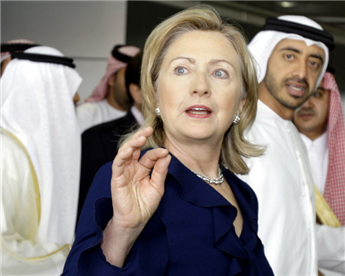Hillary Hauls Out Old 'Extremist' Rap

The secretary of state walks with the
United Arab Emirates' foreign minister after
telling students in Abu Dhabi that the U.S.,
like Arab countries, has its share of
"extremists." AP
Politics: If there's one thing more detestable than using a crime to make political hay, it's using the crime to make the hay abroad. Hillary Clinton hit that new low in comments on the Giffords attack.
In a televised town hall meeting with Dubai students on Monday, the secretary of state told a perplexed audience that their concerns about the negative image of Muslims in the U.S. was no big deal.
"We have extremists in our country," Clinton said. "A wonderful and incredibly brave young woman Congress member was just shot by extremists in our country. We have the same kinds of problems.
"So rather than standing off from each other, we should work to try to prevent the extremists anywhere from being able to commit violence."
The statement stands out as wrong in two ways. One is the suggestion that there's no real difference between a lone wacko who shoots a congresswoman and others in Tucson, and the global scourge of Islamic terrorism. The other is the undertone of the word "extremist," a pejorative the Clinton administration used to discredit political opponents in the 1990s. For a secretary of state to deliver such a message abroad ill serves the interests of America.
On the surface, it would seem that Clinton was trying to win over the students in Abu Dhabi by blaming the media and U.S. public ignorance for the perception that the U.S. public seems to have blamed the entire Arab world for the crimes of 9/11.
If she were honest when she was presented with such a question, she might have pointed out that bankrolling al-Qaida, using the Protocols of the Elders of Zion as a school textbook and dancing in the streets at the deaths of 3,000 Americans is not the way to enhance the image of Arabs in the world, if that was what they really wanted.
But Clinton took a more cowardly tack, trying to assure her audience that all nations had extremists, so there was nothing particularly unique about the Arab version. It was the old "everybody does it" equivocation that enlightens no one.
That's a pretty lame placebo for a group that sorely needs to be educated about the consequences of coddling terrorists and their potential for destroying democratic states. Terror groups are run by perfectly sane leaders who justify their acts with claims of heavenly mandates, but otherwise hold much in common with organized crime. The Tucson shooter appears to be little more than a nut.
Aside from the lazy equivocation, however, Clinton's use of "extremist" carried an undercurrent of domestic partisanship, something no Cabinet official, let alone the secretary of state acting abroad, is supposed to do.
"Extremist" was a word the Clinton administration used over and over in the spin cycle to discredit opposition to its political programs. Hillary herself used it against critics in 1992-93, when she headed a secretive committee to nationalize health care. She also hurled it against budget critics, abortion bombers, talk radio hosts, free marketers, religious cults and the killers of Israeli Prime Minister Yitzhak Rabin.
A precise use of an epithet? Hardly. Yet diplomacy is all about precision of words.
Condoleezza Rice and Carlos Gutierrez, secretaries of state and commerce, respectively, under President George W. Bush, were especially careful about not making partisan statements even off the record. Obama administration officials, such as Labor Secretary Hilda Solis, have exercised restraint on this front as well.
The Dubai audience may not have picked up on the undercurrents coming from Secretary Clinton, but an American audience would. Her attempts to frame the attack by one lone gunman in Arizona with all the terror of the Middle East isn't about helping Arab students get a grip — it's about denying reality and playing politics.
If Clinton couldn't address a real problem in the Middle East except in the context of domestic politics, maybe she shouldn't have addressed the issue at all.

